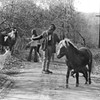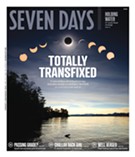Published November 16, 2005 at 5:00 p.m.
Once upon a time, people lined up around the block to buy tickets for the latest theatrical releases by Ingmar Bergman. Nostalgia gave way to surprise at the 2004 Montreal World Film Festival because the queue was so long for the North American premiere of Saraband. This work by the legendary Swedish auteur will finally screen in Vermont, at Montpelier's Savoy, at 4 p.m. this Saturday and Sunday.
Saraband is a sequel to Scenes From a Marriage, Bergman's 1973 anatomy of a crumbling relationship in which Erland Josephson and Liv Ullmann play a couple who exemplify the conundrum of a W.D. Snodgrass poem: "With love, we kill each other / Without love, we die / I tell you love is possible / We have to try." The characters, Johan and Marianne, try and try and try some more. When rage leads to divorce, they still can't stay completely apart.
In the update, made for Swedish television like its predecessor, Marianne decides to visit Johan at his country cottage after a separation of 30 years. He's a frail but still ornery widower. The younger Marianne has aged more gracefully and refers to a second husband. This being Bergman, no one is happy, although initially Marianne seems at peace with herself.
The angst escalates when Johan's morose son Henrik (Borje Ahlstedt) and teenage granddaughter Karin (Julia Dufvenius), skilled cellists who live nearby, come into focus. Johan has never stopped mourning his dead wife Anna, and Karin is similarly stuck in the past. They also share a dark secret.
Marianne becomes a sort of surrogate mother to the girl. An intricate web of family ties soon ensnares both households. Although not quite as dramatically compelling as it was three decades ago, the venom remains strong. Since Bergman has vowed this will be his last film, graying cineastes probably won't mind the sting.
Early on in Capote, opening this weekend at the Roxy in Burlington, there is a brief exchange that then hovers over the biographical film: Two Manhattan-based writers are on a train in 1959 hurtling through the rural Midwest. Harper Lee asks Truman Capote if the passing vista makes him miss their native Alabama, where they were childhood friends. "Not even a little bit," he tells her.
And yet their visit to Kansas, where she helps him research a story about the murder of a local family for The New Yorker, is very much a return to roots. Capote (Philip Seymour Hoffman, who masters the late author's eccentricities) learns that he has a lot in common with one of the killers, Perry Smith. They're both haunted by a history of parental abandonment in a milieu of alcoholism and suicide.
"It's like Perry and I grew up in the same house," Capote observes, "and one day he went out the back door and I went out the front."
That empathy becomes part of his obsession with the brooding, charismatic Smith (Clifton Collins, Jr.). The scribe must woo the criminal in order to craft an in-depth magazine piece -- the precursor of his landmark nonfiction novel, In Cold Blood. But their bond is somewhat illusory. Vowing to show the world that Smith is not "a monster," Capote burrows into this convict's human, if twisted, core. In turn, Smith envisions the literary effort leading to clemency in his death sentence. The execution, however, is an essential final chapter.
With a smart script by Dan Futter- man, director Bennett Miller coaxes uniformly Oscar-caliber performances from his cast and accurately depicts the cultural schism of mid-20th-century America.
Capote is already famous for writing the novel Breakfast at Tiffany's, hobnobbing with movie stars, and appearing on TV talk shows. He uses his celebrity to seduce the small Kansas town steeped in conformity, where a dapper little man with a singsong voice might otherwise be regarded as a freak. Only a taciturn Kansas Bureau of Investigation agent (Chris Cooper) remains wary, even though his wife (Amy Ryan) is bedazzled.
Harper Lee (Catherine Keener), who has yet to publish To Kill a Mockingbird when this 6-year celluloid saga begins, understands Capote all too well. He's a scintillating raconteur; in their New York circle, artists and intellectuals are drawn to his genius, and apparently overlook his boundless self-absorption. The same could well be true of filmgoers, who are likely to see the title character as a fascinating, flawed force of nature.
More By This Author
Comments
Comments are closed.
From 2014-2020, Seven Days allowed readers to comment on all stories posted on our website. While we've appreciated the suggestions and insights, right now Seven Days is prioritizing our core mission — producing high-quality, responsible local journalism — over moderating online debates between readers.
To criticize, correct or praise our reporting, please send us a letter to the editor or send us a tip. We’ll check it out and report the results.
Online comments may return when we have better tech tools for managing them. Thanks for reading.







































